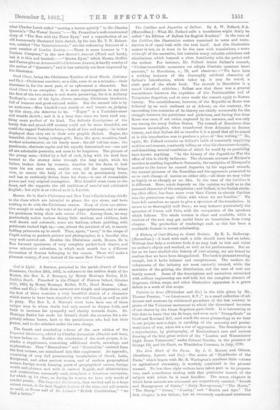The . Catiline and Jugurtha of Sallust. By A. W. Pollard,
B.A. (Macmillan.)—What Mr. Pollard calls a translation might fairly be called "An Edition of Ballast for English Readers." In the case of the Catiline, the illustrative matter contained in notes and intro. faction is of equal bulk with the text itself. And this illustrative matter is not, as is wont to be the case with translations, a mere rdchavifJ of the narrative, but contains many valuable criticisms and elucidations, which bespeak a close familiarity with the period and the author. For instance, Mr, Pollard traces Ballast's remark, " Civitas incredibile meraoratu est adepts libertate quantum brevi creverit," to gerodotus, v., 78, and observes :—" We have here• a striking instance of the thoroughly artificial character of Ballast's Introduction, which takes up, it may be noted, a sixth part of the whole book. Tho remark in Herodotus is 9. sound historical criticism ; Sallust saw that there was a general resemblance between the expulsion of the Peisistratidae and of Taiquinius Superbus, and at once made the remark apply to Roman history. The establishment, however, of the Republic at Rome was followed by no such outburst as at Athens; on the contrary, the succeeding two centuries of its history are chiefly memorable for the struggle between the patricians and plebeians, and during that time Rome was once, if not twice, captured by its enemies, and was only one among the many Italian States. The remark of Horodotus thus becomes meaningless, when transferred from Atherdau to Roman history, and that Ballast did so transfer it is a proof that all be aimed at in this introduction was to produce a piece of ' flue writing.' " So, again, Mr. Pollard remarks on Sallust's habit of constantly supplying motives and reasons, constantly tolling us what his characters thought, and describing mental conditions of which he could by no possibility have known anything. "In the history of the Jugurthine War the office of this is chiefly ludicrous. The elaborate account of Micipsa'a motives in sending Jugurtha to Nurnantia, the ascriptiou of lliempsars murder to the terror he caused Jugurtha by his supposed remark, the mental pictures of the Numidian and his opponents presented to' us on each change of tactics on either side,—all these we may value as highly or as cheaply as we like. In the case of the Catiline it is different. Here, much depends on the opinion we hold as to the personal character of the conspirator ; and Sallust, in his foolish strain- ing after effect, has done more even than Cicero to elevate Catiline into the portentous stage villain with whom we are familiar." We have left ourselves no space to give a specimen of the translation. It seems to us thoroughly well done ; we may instance particularly the speeches of Caner and Cato, with the comparison of the speakers which follows. The whole version is clear and readable, while a student of the text may get useful hints on translation from every chapter. The production of renderings such as this has been a. creditable feature in recent scholarship.






































 Previous page
Previous page